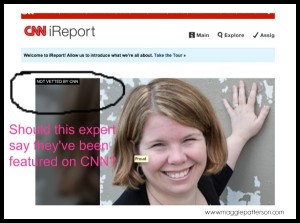Everyone, and I mean everyone is in planning mode. Getting excited for 2014, figuring out business plans, budgets and so much more.
There’s something magical about the promise of a new year, but nothing can dash those hopes as quickly as an investment gone bad.
We’ve all been there. An expert, course, a coach…something that you are sure is going to help you. But then you get going and realize something isn’t quite right. It’s not what you signed up for. The results aren’t what you thought they’d be. You are frustrated. Maybe even pissed off.
While it’s natural to want to “blame” the person you bought the service from, I’ve got a different take on it.
Have you ever heard the term “let the buyer beware”? In the online world, it’s up to you to do your homework and not take things at face value. I know for me, my “bad” investments were really the product of me not being clear on what I was looking for or not making sure it was a sound investment. My bad.
Cutting Through the Hype
In the internet marketing world, it’s time to for us to become better educated and make smarter decisions about where we invest our money. Take the responsibility on for verifying facts and making sure things are what they seem.
Think of it in dating terms. If you were going to meet up with someone you met online for a date, you’d do some homework beforehand. You’d take precautions to make sure it was safe. You should do the same damn thing with investing your money, time or energy in any program or service.
If It Looks Too Good To Be True
There’s a lot of ways to quickly verify claims made by “experts” to make sure they are legit. But too often we simply don’t take the time to do it.
Start with this. If it looks too good to be true, it probably is. Time honored wisdom if you ask me, especially when you can’t look someone straight in the eye as you make a deal. Trust your gut. If something seems hinky, you need to dig in a bit more.
As a PR pro, I’ve got a few secrets to share with you too.
You know those “logos” you see on someone’s home page saying they’ve been on big name media outlets? It’s not always what it seems.
There’s lots of ways to self-publish content on these outlets, which is fine to a point. But if it doesn’t go through an editor of some sort, should you really be taking it as third party credibility?
Here’s the perfect example. If you use certain paid packages on newswires that distribute press releases such as Marketwire and PR Newswire, your press release will repost to sites like Yahoo! and the Wall Street Journal. That’s why at the end of these pages you have this type of message:
![]()
Another example is using CNN’s iReport. You can share your stories using this “citizen journalism” platform and then you could hypothetically claim you’ve “been” on CNN.
I actually wanted to test this out. I had my CNN debut published to the site within 1 minute of submission. Again, how much street cred is there in that? CNN makes it clear that they have not reviewed the content with the “not vetted by CNN” clearly visible.
To combat this, when you see those snazzy media logos on a home page, you need to actually look at the associated piece of coverage. Do they have the coverage listed on a press page on their site? Can you find it easily on Google?
Watch for the disclaimers that you see above from Wall Street Journal and CNN as that can tell you quickly if the coverage is self-published or a paid service.
Verifying Testimonials
Back when I was in my PR program in college I learned in my very first semester that press releases quotes are written by PR people. They are not actual quotes. I was outraged at the time to say the least.
The same goes with testimonials on sales page or “client love” pages. They are crafted with an eye on getting you to buy from them. I think we all know it’s not exactly an unbiased review, as obviously everyone is going to showcase the most relevant testimonials.
Look at the tone and manner of testimonials. Who do they come from? Take a glance at the person providing the testimonial to see how it lines up with that their quote says.
Go beyond the face value of testimonials by asking for unbiased reviews from people you trust. For big ticket investments, talk to people who’ve done the program and ask them for the nitty gritty so you can make sure it’s the right fit for you.
A little homework upfront can help you make the right investments in your business and go a long way to helping ensure you don’t get taken.




